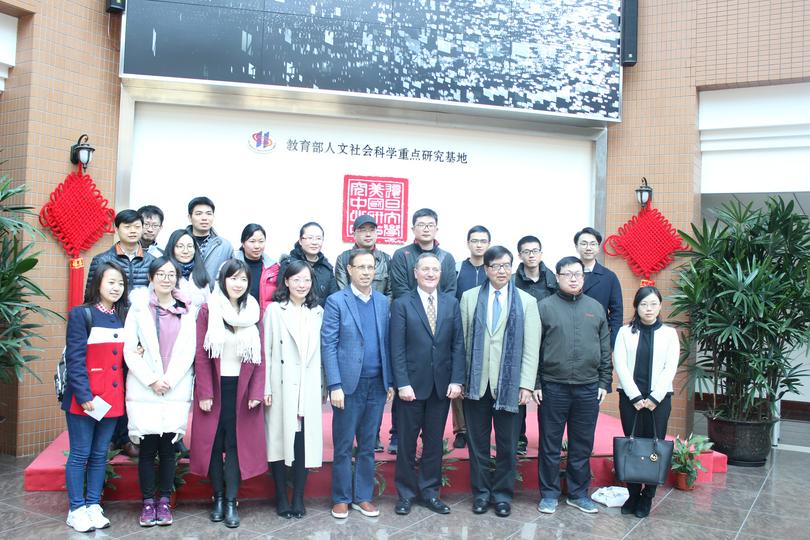On March 5, 2018, Dr. Brian Grim, president of the Religious Freedom & Business Foundation, gave a lecture titled "Religion's Contribution to the US Economy" at Fudan University.
While Oliver Wendell Holmes Sr. said, "Some people are so heavenly minded that they are no earthly good." Dr. Grim stated that religions had a positive influence on the economy through the results of a study.
Conducted by Dr. Grim and his daughter, the first American born in China after the Cultural Revolution, "The Socio-Economic Contribution of Religion to American Society: An Empirical Analysis" focused on the earthly good created by the heavenly minded.
The former senior researcher of the Pew Research Center started the lecture by how to measure the economic and social value of religions. He gave an example of measuring the economic value of love that if love resulted in marriage, his youngest daughter cost money to hold a wedding including music, meal, and hotel expenses. In a similar way, we can count on the economic impact of religions on society and people's value.
The study finds that religions contribute $1.2 trillion to the US economy every year, which makes religion the fifteenth largest national economy in the world. The sum is larger than all the major tech companies combined avenue.
Grim illustrated the unique religious impact by showing two results. Asked whether people volunteered in the past week, only 28% of non-religious respondents did whereas 45% of highly religious engaged in some kind of volunteer work. Questioned if one donated money, time, or goods to poor in the past week, 65% of highly religious people made some donations, but non-religious people were significantly lower.
He talked about three sectors of religion's economic impact to the United States: congregations, religious institutions, and faith-friendly or religion-related businesses.
Local churches, mosque, synagogues, temples, and others contribute $418 billion to the US economy a year. Economic activities of congregations provide things like training, meetings, and buying water. 420,000 teachers are employed in faith-based schools, and 4,500,000 students study in primary&secondary schools. Magnet effects contain attracting people to visit houses of worship. Individual impact includes helping people stop drinking alcohol, members finding jobs and serving HIV/AIDS patients.
The second sector is service institutions. Charities, healthcare, and higher education like the Knights of Columbus, Catholic hospitals, or Brandeis University create around $300 billion in the US annually. The third area, religion-related businesses, contribute about $438 billion a year, including faith-based and faith-inspired businesses. Factories of Tyson Foods, the world's second-largest processor and marketer of chicken, beef, and pork hire chaplains to care for the spiritual needs of its workers. There are more than 1,000 US business factories that have chaplains. The C12 group has 2,500 Christian CEOs across businesses.
In addition, Dr. Grim shared one of his friends' stories that the religious man donated 98% of his income after realizing that the purpose of life was to love his neighbor as himself. He sold everything and moved to Mozambique, one of the poorest countries in the world. He gave 90% of the profits back to people in the country.
Quoting his professor' word, he concluded that goals of social science were to discover new knowledge useful to people and that was what he attempted to do.
The lecture was presided over by Professor Xu Yihua, director of Department of International Politics at Fudan University. It was sponsored by Fudan University's Center for the Study of Religion and China's National Security coupled with School of International Relations and Public Affairs.













